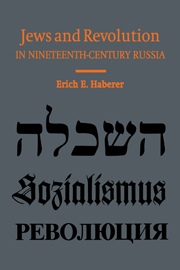Book contents
- Frontmatter
- Contents
- Preface
- 1 Introduction: The beginnings of Russian–Jewish radicalism, 1790–1868
- Part 1 The Chaikovskii circles: Jewish radicals in the formative stage of revolutionary Populism, 1868–1875
- Part 2 The Land and Freedom Party: Jews and the politicization of revolutionary Populism, 1875–1879
- Part 3 The Party of the People's Will: Jewish terrorists of socialist conviction, 1879–1887
- 8 Motives of revolution
- 9 Technicians of terrorism
- 10 The pogroms of 1881–1882
- 11 Epigones and pioneers
- 12 Conclusion: Haskalah and the socialist promise of salvation
- Appendix
- Abbreviations
- Notes
- Bibliography
- Index
8 - Motives of revolution
Published online by Cambridge University Press: 22 January 2010
- Frontmatter
- Contents
- Preface
- 1 Introduction: The beginnings of Russian–Jewish radicalism, 1790–1868
- Part 1 The Chaikovskii circles: Jewish radicals in the formative stage of revolutionary Populism, 1868–1875
- Part 2 The Land and Freedom Party: Jews and the politicization of revolutionary Populism, 1875–1879
- Part 3 The Party of the People's Will: Jewish terrorists of socialist conviction, 1879–1887
- 8 Motives of revolution
- 9 Technicians of terrorism
- 10 The pogroms of 1881–1882
- 11 Epigones and pioneers
- 12 Conclusion: Haskalah and the socialist promise of salvation
- Appendix
- Abbreviations
- Notes
- Bibliography
- Index
Summary
Despite the obvious presence of Jews in Chernyi Peredel, it has been argued that Jews qua Jews were more attracted to Narodnaia Volia because political terrorism was more congenial to Jewish participation than the theory and practice of traditional Populism. In this view – most forcefully put forth by Elias Tscherikower – the new political orientation and its urban-centred terrorist activity significantly ‘broadened the range of possibilities for Jewish revolutionaries – both psychologically and factually’. Factually, it provided Jews with the unprecedented opportunity to be active in an urban environment that was much more conducive to their natural abilities and national characteristics: instead of acting as propagandists in the name of an alien ideology in an alien peasant environment, they now were able to partake in activities where their Jewishness was less of a liability than previously. Without feeling a sense of inferiority, without necessarily divesting themselves of their Jewish traits, as Narodovoltsy they could participate fully and effectively in the sort of work for which they were ideally suited as Jews. In short, their characteristically Jewish abilities of ‘underground organization’ and ‘technical know-how’ were a real asset readily appreciated and sought after by their Russian comrades. Psychologically, Narodnaia Volia provided Jews with a political rationale for revolutionary action that was much more in tune with their experience of Jewish rightlessness than Populist abstractions of social revolution.
Leaving aside for the moment the hypothesis that the fight for political freedom was more attractive to the Jewish psyche than Populist peasantism, it is difficult to go along with the argument that the urban character and technical requirements of terrorism vastly extended the scope of Jewish involvement.
- Type
- Chapter
- Information
- Jews and Revolution in Nineteenth-Century Russia , pp. 173 - 185Publisher: Cambridge University PressPrint publication year: 1995



